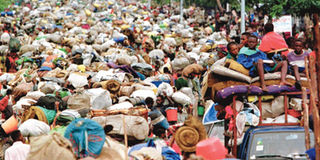African war literature is, alas, thriving!

PHOTO | FILE Rwanda refugees return from DR Congo after the 1994 genocide. As coups, counter-coups, and protracted civil wars became common in many African countries starting from the 1960s, this deadly reality was most effectively interrogated and mediated by African literature.
What you need to know:
- The deadly reality of coups, counter-coups, and civil wars was most effectively interrogated by African literature
In a recent article on this page (December 16, 2012) Silas Nyanchwani expressed curiosity over the supposed disengagement of African literature, and young African writers in particular, from the “wars and turmoil” in post-independence Africa.
The author lamented that, “the only known thing close to literature” to have come out of the war-torn countries is “the movie and documentary Blood Diamond from Hollywood”. The observation is grossly inadequate.
As coups, counter-coups, and protracted civil wars became common in many African countries starting from the 1960s, this deadly reality was most effectively interrogated and mediated by African literature.
Only a few months ago, Indiana University Press, in its Global African Voices series, released the English translations of two of the finest novels by African writers in the 21st century – Transit by Abdourahman A. Waberi and The Past Ahead by Gilbert Gatore (a debut by a 27-year-old man).
They were originally published in French in 2003 and 2008 respectively. The first of these grapples with the 1990s civil war in Djibouti, the second with the 1994 genocide in Rwanda. Both exemplify Aeschylus’s thought, quoted at the beginning of the epilogue in Transit, “To tell is suffering. To be silent is suffering too”.
Demobilised soldier
Transit is made up of short, alternating chapter-monologues delivered in distinct tone and rhythm by five characters: Bashir, a young demobilised soldier in Djibouti’s civil war; Harbi, an intellectual and an opponent of the Djiboutian regime; Harbi’s wife, Alice, a progressive Frenchwoman; their son, Abdo-Julien, a widely-read and idealistic youth; and Harbi’s father, Awaleh, the patriarch who embodies the wisdom and dignity of the Djibouti of old.
These stories interleave and complement one another to build a heart-rending tale of Djibouti’s violated history and its troubled present, as they propel the action towards a tragic end.
It is Bashir who, in his slangy, darkly humorous but also funny language exposes the abyss into which the country has fallen, voicing the brutality that has been unleashed during the civil war and in its aftermath: “Oh, the army was big mess. Holy Moly! We killed the Wadags, screwed their daughters, poisoned wells...”
His seeming simple-mindedness and naiveté lend his scathing sketches of politicians and of France, the former colonial power, a poignant credibility: “Before, there was war back home, the war kind of over now cause Big Foreigners they say: better stop that war right away or no foreign aid”.
As it turns out, Harbi and Bashir have been speaking from “the intestines” of Roissy-Charles de Gaulle airport. They are both waiting to enter France as refugees: Bashir, exuding a pragmatic confidence that may well help him to deal with the humiliations in store for him; and Harbi, whose wife, son and father have been devoured by the war, contemplating the future with a profound sense of loss.
But even though he is fleeing a country “where you go from eclipse to fall, your body frozen and your soul turned to stone”, Harbi still has the courage to believe that, “You need to leave in order to return and construct something; one can only build on ruins!”.
The two main characters in The Past Ahead, are survivors of the genocide in Rwanda. Isaro, a young woman who is adopted by a devoted French family after the murder of her parents, has lived in France in oblivion of her past. But a radio report one morning disrupts her illusory peace and compels her to return to her birthplace to gather the hitherto silent stories of both the survivors and the perpetrators of the violence. As has been observed of other war novels, the unspoken unspeakable is not dead but silently resides in the body and in the recesses of the mind, from where an unexpected stimulus can catapult it to the surface.
Niko, on his part, has withdrawn from the world and lives in a perilous cave on a deserted island. Hints build up to suggest that whatever dark experiences Niko is enclosing will inevitably come to light. Indeed it soon emerges that Niko is haunted by the murderous crimes he committed during the war. But self-concealment is not an option to be taken for granted; guilt must take its place alongside agony and, in this case, self-annihilation.
In this well-designed novel-within-a-novel, Niko is in fact a character written by Isaro, probably drawn from her interviews with the people and from her imagination. Bit by bit, through his relentless memory trips, which are excruciatingly painful and steeped in violence, we gather the pathetic history of this mute, disfigured, never-loved being, and begin to view his behaviour from the perspective of his past.
Amidst wide acclaim for his novel, Gatore has been accused of insensitivity in attempting to make the reader empathise with a war criminal and in creating a strong “link” between victim and killer. Gatore’s interest, however, lies in portraying the vulnerability of individual men when faced with overwhelming historical forces. His introspective prose also reveals how war creates the circumstances in which a damaged psyche “thrives”.
Both Transit and The Past Ahead are excellent elegies in prose. They are destined to remain permanent works engendered by first-hand experiences and memories of war.
African war literature has thus had a long tradition.




